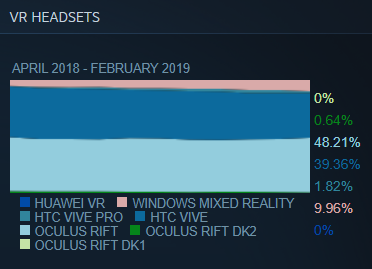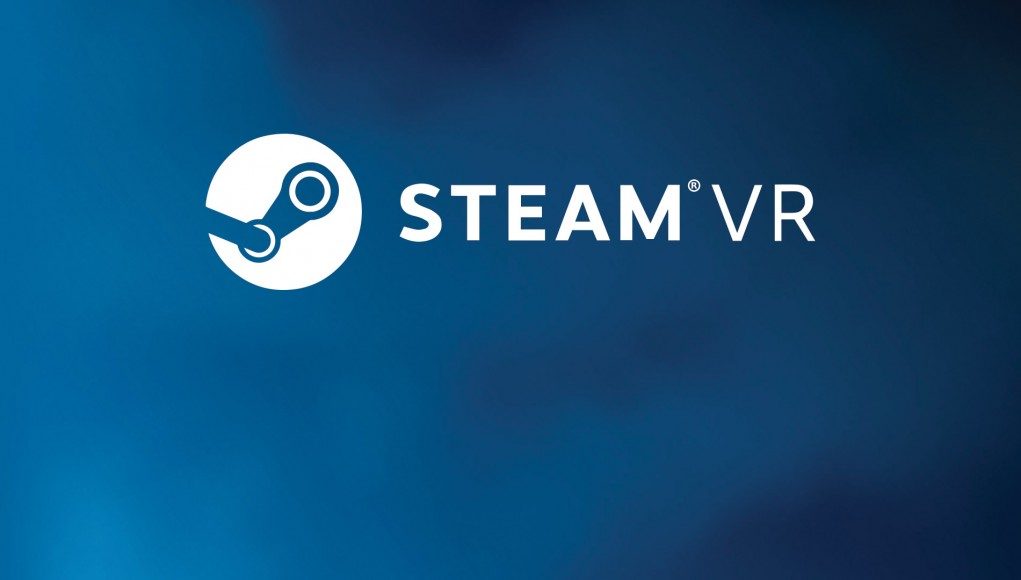The latest data from Valve’s Steam Survey shows the Rift and Windows VR headsets continuing growth streaks in their share of monthly-connected headsets on Steam, snatching share mostly from the Vive and Vive Pro.
Each month Valve collects info from Steam users to determine some baseline statistics about what kind of hardware and software is used by the platform’s population, and to see how things are changing over time; that includes which VR headsets are connected to users’ computers. Participation in the survey is optional, and headsets aren’t counted if they aren’t powered on and recognized by the user’s PC at the moment that the data is collected. Data is captured over the course of the month which tells us how many unique headsets were connected to users’ PCs over that time period; we call the resulting figure ‘monthly-connected headsets’ for clarity.
Compared to January’s record-setting movements, monthly-connected headsets on the platform fell slightly in February, from 0.91% of the total Steam population to 0.89%. This discrepancy could be related to January being three days longer than February, but it’s tough to say with certainty without exactly how Valve calculates the figures behind the scenes.
In terms of the market share among different headsets on the platform, the Rift and Windows VR headsets came out ahead in February.

The Rift saw its third month of continuous growth, reaching 48.21% (+1.18%) which is just below its all-time high of 48.92% set back in March 2018. The Rift was likely helped in recent weeks by its price reduction to $350 which happened back in January.
Windows VR headsets are now on their tenth month of continuous growth, reaching 9.96% (+1.02%) share of headsets on the platform, which is also the new all-time high for the headsets. Windows VR headsets seem to be continuously discounted, including some big sales on the Samsung Odyssey last month, which likely contributed to the ongoing growth.
Those gains came primarily at the expense of the Vive and Vive Pro. The Vive dropped to 39.36% (-1.26%) share, while the Vive Pro dropped to 1.82% (-0.78%). When looking at the share of the two headsets together, HTC’s overall share of headsets on Steam has been steadily decreasing, down to 41.18% in February from 45.38% a year prior.
The Vive headsets don’t go on sale as often as other headsets; during the 2018 holiday shopping season HTC didn’t offer any official discounts on the original Vive, and presently the headset’s $500 MSRP is $150 more than its most direct competitor, the Rift. The Vive Pro, meanwhile, is positioned in a price class of its own (compared to other consumer headsets), with an $800 asking price for the headset alone, or $1,100 for the ‘starter kit’ (which includes the tracking beacons and controllers needed to use the headset).
Beyond the price differences, HTC also has a new PC headset on the way, the Vive Cosmos, which was announced in January. The looming presence of a new headset set to launch in “early 2019” may be suppressing sales of the Vive and Vive Pro in recent weeks, and could have knock-on effects for the usage of current Vive headsets on Steam. HTC has also continued to aggressively expand its Viveport platform, which itself directly competes Steam; if HTC succeeds in attracting users to Viveport, it would likely be directly contributing to a reduced market share of Vive headsets on Steam.
Taken together, the above means that reductions in the share of the Vive and Vive Pro on Steam aren’t unexpected, but things are likely to come to a head when HTC launches Vive Cosmos. While technically SteamVR compatible, Cosmos will likely feature Viveport as the primary content platform and the ‘Vive Reality System’ as the headset’s operating environment out of the box, leaving SteamVR as a secondary option.







